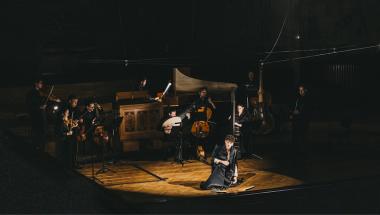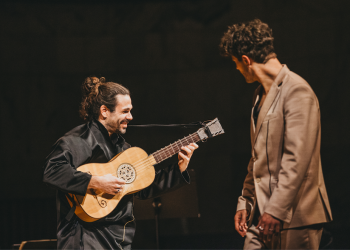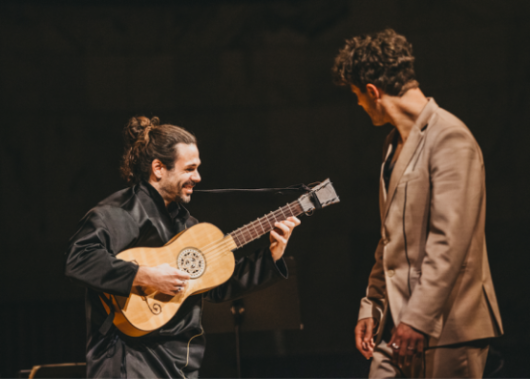 United States Various, ‘Beyond’: Jakub Józef Orliński (countertenor), Il Pomo d’Oro. Cal Performances, Zellerbach Hall, University of California, Berkeley, 9.4.2024. (HS)
United States Various, ‘Beyond’: Jakub Józef Orliński (countertenor), Il Pomo d’Oro. Cal Performances, Zellerbach Hall, University of California, Berkeley, 9.4.2024. (HS)

Monteverdi – ‘E pur io torno qui’ from L’incoronazione di Poppea; ‘Voglio di vita uscir’
Marini – ‘Passacalio’ from Per ogni sorte di strumento musicale
Caccini – ‘Amarilli, mia bella’ from Le nuove musiche
Frescobaldi – ‘Così mi disprezzate” from Arie musicali, Book 1’
Kerll – Sonata for Two Violins in F major
Strozzi – ‘L’amante consolato’ from Cantate, ariette e duetti, Op.2
Cavalli – ‘Incomprensibil nume’ from Pompeo Magno
Pallavicino – Sinfonia from Demetrio
Netti – ‘Misero core…’, ‘Si, si, si scioglia si…,’ ‘Dolcissime catene’ from La Filli; ‘Quanto più la donna invecchia’ and ‘Son vecchia, patienza’ from L’Adamiro
Sartorio – ‘La certezza di tua fede’ from Antonino e Pompeiano
Jarzębski – Tamburetta from Canzoni e concerti
Moratelli – ‘Lungi dai nostri cor’ from La Faretra smarrita
Few recitals begin on a darkened stage, the vocalist peering out into the ether while a ten-piece ensemble plays the introduction to the first aria. Recitals do not generally use clothing as a prop to fashion dramatic and comedic roles, nor does the singer dance to instrumental interludes. But when it is Polish countertenor Jakub Józef Orliński, it makes perfect sense: it showcases his unique range of talents. His clarion sound and liquidity of voice produce a focused alto that can describe the curlicues of Baroque coloratura with deadeye accuracy and caress the beauty of long melodic lines. Orlinski is also a champion breakdancer whose limber body can be as expressive as his voice. Above all, he connects with his audience.

His longtime collaborator, musicologist Yannis François, assembled a series of mostly obscure Baroque arias and songs that fit the singer’s vocal and dramatic assets into an amazingly coherent narrative. ‘Beyond’ aims to take a familiar topic in Baroque opera – the yearning for love and the unexpected results when things do not work out as one hoped – and find resonances with the way we live today.
At Zellerbach Hall, ‘Beyond’ plumbed seventeenth-century arias, dramatic scenes and a few comic moments for playful and otherwise telling aspects. It was all underscored by the early-music group Il Pomo d’Oro (also longtime collaborators with Orliński), and it made for an exciting, seamless, 75-minute delight.
Using a flowing, shiny-black, gold-embroidered cloak as a creative prop, Orliński began with a familiar piece from Monteverdi’s L’incoronazione di Poppea. In Ottone’s entrance aria, the cloak clutched tightly around his body, he realizes his beloved Poppea may be dallying with the emperor. The music ranges from pure love to rage, an eight-minute tour de force that displayed Orliński’s liquid legato and effortless dynamics.
A smooth interlude, Biagio Marini’s ‘Passacalio’, gave the singer a chance to catch his breath before returning for another Monteverdi concert aria that felt like a continuation of the scene: ‘Voglio di vita uscir’ (‘I wish to depart this life’). And that led to ‘Amarilli, mia bella’ by the lesser-known Giulio Caccini and the better-known Girolamo Frescobaldi’s ‘Così mi disprezzate’ (‘Is this how you scorn me?’). It all felt like it belonged together, creating a lapel-grabbing opening sequence.
Sonata for Two Violins in F major by Johann Caspar Kerll gave Pomo d’Oro’s violinists Alfia Bakieve and Jonathon Ponet a dazzling moment in the spotlight, the ensemble’s vigor bringing freshness to these neglected pieces. Orliński roamed the loge holding a light so we could follow his progress and found a corner of the side mezzanine to deliver a refreshingly positive-toned arietta, ‘L’amante consolato’ (‘The consoled lover’) by Barbara Strozzi, an early example of a professional composer who was a woman.
The last few pieces on the program amounted to a sequence that veered to extremes but somehow held together. An affirmative aria praising love, ‘Incomprensibil nume’ by Francesco Cavalli, led to a lively Sinfonia by Carlo Pallavicino, during which Orliński picked up his cloak from the floor and danced merrily around the stage, the hem spinning like a woman’s gown.
Then came the final scene of Giovani Cesare Netti’s opera, La Filli, which begins with a lament at the character’s fate and ends on a lovely note of acceptance. Theorbo player Alberto Gaspardo stepped forward with a guitar and began with an improvised solo before the music segued into a bouncy, folk-like song, ‘La certezza di tua fede’ (‘The sureness of your devotion’) by Antonio Sartorio. It wiped away any gloom – at least briefly – in a burst of countertenor coloratura.
In a remarkable change-of-pace, Orliński wrapped himself in his cloak, his head covered with a black shawl, and emerged as an aged woman for two comedic Netti arias from L’Adamiro. ‘Quanto più la donna invecchia’ (‘The more a lady ages’), delivered in a strained voice, self-mocked the ravages of age; and the faux-lament ‘Son vecchia, patienza’ (‘I am old, have patience’) included some (intentionally) shaky-voiced passages.
A dancy instrumental piece, Adam Jarzębski’s ‘Tamburetta’, introduced a bit of Baroque music from Orliński’s native Poland (and gave him a chance to show off some of his eye-popping breakdancing. The program ended with ‘Lungi dai nostri cor’ (‘Far from our hearts’) by Sebastiano Moratelli, a simple lament delivered with simplicity and grace to the final line, translated as ‘The name of Love perishes though still alive’. Fade to black.
Beyond Orliński’s vocal gymnastics, elegant phrasing and stage-worthiness, the brilliance of all this came in the way the musical narrative built gradually to highs and lows, ending with that final group of marvelous works. Four encores delivered a further range of virtuosity. ‘Chi scherza con amor’, an aria from Boretti’s Eliogabolo, skipped along merrily. ‘Lucidissima facce’ from Cavalli’s La Calisto brought limpid, lyric singing. Best of all, ‘Che m’ami ti prega’ from Orlandoni’s Nerone brimmed with speedy coloratura and took an occasional dip into the singer’s baritone range. A repeat of ‘La certezza di tua fede’ sent the audience home smiling.
Harvey Steiman
